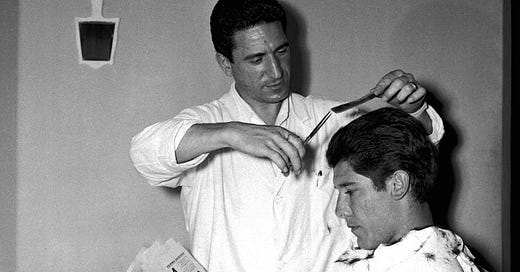"A sort of living room, for the townsmen"
What Port William's barber, Jayber Crow, can teach us about hospitality
Jayber Crow was Port William’s barber. When he arrived, “the town’s most recent barber had died,” and he purchased the shop. But his imprint on the town went far beyond cutting hair and shaving faces. He was embedded in the community, and, in a real sense, his hospitality helped strengthen it.
Jayber Crow was the first Wendell Berry book I read—my first visit to Port William. But in this post I want to highlight Berry’s description of Jayber and his barbershop from an earlier novel, A Place on Earth.1
A public living room
The barbershop was “both his place of business and his home.” It had two stories. The upstairs room contained “all the essentials of his life … bed, books, table, chair, dresser, kitchen cabinet, cookstove.” But the shop downstairs was “his living room and guest room.” Berry describes it as a public space.
It’s described as a “loafing and talking place, a sort of living room, for the townsmen, and for Jayber himself.”2 The barbershop often has more visitors—“what Jayber calls ‘members’”—than customers. “The shop is his living room and guest room, to which most of the men of the town consider they have a standing invitation.”
My space, and my time
The description of Jayber Crow’s barbershop is arresting. In our culture we tend to see our homes as retreats from others. We safeguard our space and our time. When we do engage in hospitality, we set such high standards for cleanliness and entertainment that we need a sizable break before we invite anyone again. And it doesn’t help that the product of hospitality we aim to offer must be worthy of Instagram.
All of this happens while we are more isolated than ever. It feels like every week I hear a friend express how much they long for deeper community. But the thought of welcoming people into your home, of practicing hospitality, feels overwhelming. We imagine that what we need are surpluses of time and space and energy. And this is worlds apart from Jayber’s shop.
The space itself is never described as anything fancy—though it is described as interesting, and small. (In Jayber Crow we’re given dimensions: “twelve by twenty-four feet”). And even in terms of time, Jayber’s approach to hospitality is different from ours: “His shop may be closed for three days at a stretch, or open any hour of the night.”
This hospitality is, of course, aided by Jayber’s singleness. But it’s also much closer to the kind of hospitality we find in the Bible than what most of us in the West encounter on a day-to-day basis.
Hospitality and the Bible
Hospitality permeates Scripture. Consider Abraham’s hospitality in Genesis 18, or the command God gives his people to love strangers: “When a stranger sojourns with you in your land, you shall not do him wrong. You shall treat the stranger who sojourns with you as the native among you, and you shall love him as yourself, for you were strangers in the land of Egypt: I am the LORD your God” (Leviticus 19:33–34, ESV).
This is reiterated in the New Testament. The Gospels are full of glimpses of radical hospitality. And the letters offer direct exhortations:
“Contribute to the needs of the saints and seek to show hospitality” (Romans 12:13).
“Do not neglect to show hospitality to strangers, for thereby some have entertained angels unawares” (Hebrews 13:2).
“Show hospitality to one another without grumbling” (1 Peter 4:9).
Hospitality today
Both the Bible’s exhortations and descriptions of hospitality—and Berry’s description of Jayber’s—can feel foreign to us. And yet we need to wrestle with them. How can we be faithful to what our Lord calls us to while we neglect hospitality? How can we foster a culture of hospitality in relation to our fellow church members, our neighbors, and even total strangers?
This is where Berry’s description of Jayber’s barbershop is so helpful. What would happen if we thought of our homes as “a sort of living room, for the townsmen”? Much fruit would follow: community for the isolated, care for those in need, an environment to tell people about Jesus.
Not everyone will have the same capacity for this kind of hospitality. But if we set aside notions of Instagram-worthy entertainment and instead embraced biblical hospitality, we would grow in our friendships and begin to build the kind of community we long for but so often lack.
I would love to hear from you. What stands in the way of thinking of our homes as places to which many consider they have a standing invitation?
I believe A Place on Earth is Berry’s finest work of fiction, counting his novels and collection of short stories. But I do usually recommend either Hannah Coulter or Jayber Crow to first-time readers.
The relevant phrase, “a sort of living room,” was absent in the revised edition of A Place on Earth, which was published in 1983 "(“the shop is also a loafing and talking place for the townsmen, and for Jayber himself”). It presumably was also absent in the original edition of 1967. Berry references “a good many further changes” in the 2001 edition, the edition from which I quote in this post.





